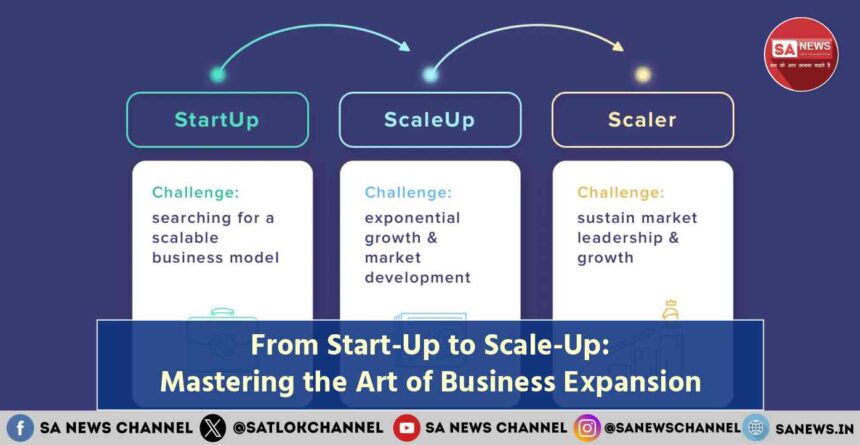Growing a business is the dream of every entrepreneur. Scaling, however, requires more than ambition; it demands strategy, planning, and a deep understanding of how to expand effectively without compromising quality or stability. This guide breaks down the key elements of scaling a business, offering precise steps, practical tips, and actionable advice.
- Understanding Scaling vs. Growth
- Key Indicators That Your Business is Ready to Scale
- Steps to Successfully Scale Your Business
- Challenges of Scaling and How to Overcome Them
- Case Studies: Companies That Scaled Successfully
- Practical Tips for Sustainable Scaling
- Tools and Resources to Aid Scaling
- Scaling with Sustainability in Mind
- The Role of Technology in Scaling
- Measuring Success During Scaling
- Common Mistakes to Avoid When Scaling
- Final Thoughts
- Scaling with Purpose: The Journey Within
- Connect With Us on the Following Social Media Platforms
Understanding Scaling vs. Growth
Before diving into strategies, it’s crucial to differentiate between scaling and growth.
- Growth involves increasing revenue, resources, and costs at a similar rate. For example, hiring more employees to match the rise in customer demand.
- Scaling, on the other hand, focuses on increasing revenue without a proportional increase in costs. It’s about maximizing efficiency and leveraging existing resources for greater output.
The goal of scaling is to achieve exponential growth while maintaining control over operations and minimizing overhead costs.
Key Indicators That Your Business is Ready to Scale
Not all businesses are ready to scale. Attempting to expand too early can lead to operational chaos, financial strain, and damaged reputations. Look for these signs to ensure you’re prepared:
- Consistent Revenue Growth
If your revenue has been steadily increasing for at least 12-24 months, it’s a sign of market demand for your product or service. - Proven Business Model
A scalable business has a model that works efficiently on a small scale and can be replicated on a larger scale without significant changes. - Strong Team
Scaling requires a skilled, adaptable team capable of managing increased responsibilities. - Market Demand
Analyze market trends, customer feedback, and competition. If demand exceeds your current capacity, it may be time to scale. - Operational Efficiency
Your processes and systems should be streamlined and ready to handle increased workload without breaking down.
Steps to Successfully Scale Your Business
1. Develop a Clear Vision and Strategy
Scaling requires a clear roadmap. Define your long-term goals and break them into actionable steps. Address these key questions:
- What are your revenue targets for the next 1, 3, and 5 years?
- Which products or services will drive this growth?
- How will you manage increased demand?
A strong strategy aligns your team, resources, and operations, ensuring everyone works towards the same objectives.
2. Focus on Your Core Offering
Avoid the temptation to diversify too quickly. Instead, concentrate on perfecting your core product or service. Scaling works best when your primary offering has a proven track record of success and customer satisfaction.
3. Build Scalable Systems and Processes
Efficient systems are the backbone of scaling. Consider:
- Automation: Invest in tools to automate repetitive tasks, such as customer relationship management (CRM), email marketing, and accounting.
- Standard Operating Procedures (SOPs): Document workflows for consistency and efficiency.
- Cloud Solutions: Adopt scalable technology, like cloud computing, to manage data and operations seamlessly.
4. Secure Adequate Funding
Scaling often requires significant investment in marketing, technology, and hiring. Explore funding options such as:
- Bootstrapping: Reinvest profits into the business.
- Loans: Seek small business loans or lines of credit.
- Investors: Pitch your business to venture capitalists or angel investors.
- Crowdfunding: Use platforms like Kickstarter or GoFundMe to raise funds.
5. Strengthen Your Team
Hire people who align with your vision and bring expertise to the table. Focus on:
- Leadership: Strong leaders guide teams through the challenges of scaling.
- Training: Invest in employee development to build a skilled workforce.
- Culture: Foster a positive work environment to retain top talent.
6. Leverage Data and Analytics
Data-driven decisions minimize risks and maximize efficiency. Use analytics to:
- Track customer behavior and preferences.
- Measure the performance of marketing campaigns.
- Identify areas for improvement in operations.
Tools like Google Analytics, Tableau, and HubSpot can provide valuable insights.
7. Expand Marketing Efforts
To scale, you must reach a broader audience. Enhance your marketing strategy by:
- Investing in Digital Marketing: Leverage social media, search engine optimization (SEO), and pay-per-click (PPC) advertising.
- Building Brand Loyalty: Engage customers through personalized communication and loyalty programs.
- Exploring New Channels: Test emerging platforms or partnerships for growth.
8. Focus on Customer Experience
Customer retention is just as important as acquisition. Enhance their experience by:
- Providing excellent support.
- Seeking feedback and acting on it.
- Personalizing interactions.
■ Also Read: Financial Management for Start-ups: The Critical Ingredient Most Fail to Master
Happy customers become brand advocates, helping you scale through referrals.
Challenges of Scaling and How to Overcome Them
Scaling is not without risks. Be prepared for these challenges:
1. Cash Flow Issues
Rapid growth can strain finances. To manage cash flow:
- Create a detailed budget and stick to it.
- Negotiate favorable terms with suppliers.
- Monitor expenses closely.
2. Maintaining Quality
Scaling quickly can compromise quality. Avoid this by:
- Implementing rigorous quality control measures.
- Training employees to uphold standards.
- Prioritizing customer feedback to identify issues early.
3. Overloading Your Team
An overworked team leads to burnout and inefficiency. Prevent this by:
- Hiring additional staff as needed.
- Delegating responsibilities effectively.
- Encouraging work-life balance.
4. Competition
Scaling often attracts competitors. Stay ahead by:
- Innovating and staying updated on industry trends.
- Building strong customer relationships.
- Differentiating your brand through unique offerings.
Case Studies: Companies That Scaled Successfully
1. Airbnb
Airbnb scaled rapidly by focusing on its core offering: affordable, unique accommodations. By leveraging technology, data analytics, and a user-friendly platform, the company expanded globally without significant overhead costs.
2. Zoom
Zoom capitalized on the growing demand for remote communication by offering a scalable video conferencing solution. The company prioritized user experience, seamless integrations, and a freemium model to attract and retain users.
3. Amazon
Amazon’s success lies in its ability to scale its logistics, technology, and customer service. By investing in automation and building a vast network of warehouses, the company became a global leader in e-commerce.
Practical Tips for Sustainable Scaling
- Stay Flexible
Markets change, and so do customer needs. Be prepared to adapt your strategies. - Monitor Progress
Set key performance indicators (KPIs) to track progress and identify areas for improvement. - Seek Expert Advice
Consider hiring consultants or joining entrepreneur networks for guidance. - Prioritize Sustainability
Scale at a pace that your business can handle. Overextending resources can lead to failure.
Tools and Resources to Aid Scaling
Scaling a business requires leveraging the right tools and resources. Here are some essential categories and examples to support your growth:
1. Project Management Tools
Efficient project management ensures your team stays organized and aligned. Popular tools include:
- Trello: Great for visualizing tasks and workflows.
- Asana: Ideal for task assignment and progress tracking.
- Monday.com: A flexible tool for team collaboration and project planning.
2. Customer Relationship Management (CRM)
A robust CRM helps you manage customer interactions and streamline sales. Consider:
- HubSpot CRM: Offers free and scalable options for growing businesses.
- Salesforce: A powerful platform for managing customer data and sales pipelines.
- Zoho CRM: Affordable and feature-rich for small to medium businesses.
3. Financial Tools
Accurate financial tracking is critical when scaling. Use tools like:
- QuickBooks: Simplifies accounting and expense management.
- Xero: Provides cloud-based accounting for real-time financial insights.
- Wave: A free tool for invoicing and basic financial tracking.
4. Marketing Tools
Effective marketing drives scalability. Key platforms include:
- Google Ads: For targeted pay-per-click advertising.
- Mailchimp: Excellent for email marketing campaigns.
- Hootsuite: Simplifies social media scheduling and management.
5. Analytics Tools
Data analysis guides decision-making. Some popular tools are:
- Google Analytics: Tracks website traffic and user behavior.
- Tableau: For creating interactive data visualizations.
- Mixpanel: Monitors user engagement and retention metrics.
Scaling with Sustainability in Mind
In today’s world, sustainable scaling is not just a trend—it’s a necessity. Companies that prioritize environmental and social responsibility build stronger brands and attract loyal customers. Here’s how to scale sustainably:
1. Optimize Resource Usage
Minimize waste by improving efficiency in production, packaging, and logistics. For example, using recycled materials or adopting energy-efficient practices can significantly reduce costs and environmental impact.
2. Partner with Ethical Suppliers
Ensure your suppliers follow ethical labor practices and sustainable production methods. This builds trust with socially conscious customers.
3. Invest in Renewable Energy
Switching to renewable energy sources for operations, such as solar or wind power, can lower long-term costs and enhance your eco-friendly image.
4. Support Local Communities
Engage with and give back to the communities you operate in. This could include hiring locally, supporting local businesses, or contributing to social initiatives.
The Role of Technology in Scaling
Technology plays a pivotal role in scaling by enhancing efficiency, communication, and customer experience. Here are some examples:
1. Artificial Intelligence (AI)
AI can automate tasks, provide customer insights, and personalize user experiences. For instance, chatbots powered by AI can handle customer inquiries 24/7.
2. Cloud Computing
Cloud solutions like AWS, Google Cloud, and Microsoft Azure provide scalable infrastructure for data storage, application hosting, and remote collaboration.
3. E-Commerce Platforms
If your business involves selling products, platforms like Shopify, WooCommerce, or BigCommerce can help you scale your online store seamlessly.
4. Cybersecurity
As you scale, protecting customer data becomes increasingly important. Invest in robust cybersecurity measures, such as firewalls, encryption, and multi-factor authentication.
Measuring Success During Scaling
Tracking progress ensures you stay on the right path and make necessary adjustments. Key metrics to monitor include:
- Customer Acquisition Cost (CAC)
How much does it cost to acquire a new customer? A lower CAC indicates efficient marketing and sales efforts. - Lifetime Value (LTV)
This measures the total revenue you can expect from a customer over their relationship with your business. A high LTV means strong customer retention and satisfaction. - Profit Margins
Monitor both gross and net profit margins to ensure scaling doesn’t erode profitability. - Employee Productivity
Evaluate output per employee to ensure your team remains efficient as it grows. - Customer Satisfaction (CSAT) and Net Promoter Score (NPS)
Regularly gather feedback to assess how well you’re meeting customer expectations.
Common Mistakes to Avoid When Scaling
1. Expanding Too Quickly
Rapid expansion without proper preparation can overwhelm your operations and damage your reputation. Scale steadily and strategically.
2. Ignoring Cash Flow Management
Even profitable businesses can fail due to poor cash flow. Ensure you have enough working capital to cover operational costs during growth phases.
3. Failing to Delegate
As your business grows, you can’t manage everything yourself. Trust your team and delegate tasks effectively.
4. Underestimating Competition
Scaling often puts you on the radar of larger competitors. Stay agile and continuously innovate to maintain your edge.
5. Neglecting Company Culture
Rapid growth can dilute company culture. Prioritize communication, inclusivity, and employee engagement to maintain a cohesive environment.
Final Thoughts
Scaling a business is an exciting yet challenging endeavor. Success requires careful planning, a strong team, efficient systems, and a relentless focus on delivering value to customers.
By implementing the strategies outlined in this guide—building scalable systems, securing funding, leveraging technology, and fostering sustainable practices—you can set your business up for long-term success.
Remember, scaling isn’t a race. It’s a journey that requires patience, persistence, and adaptability. Approach it with a clear vision, and you’ll position your business for exponential growth while maintaining stability and integrity.
Scaling with Purpose: The Journey Within
While scaling a business requires vision, strategy, and resilience, true success lies in understanding the deeper purpose of life. Just as a business thrives on strong foundations, a fulfilling life is built on wisdom, devotion, and connection to the True God.
Beyond material achievements, our ultimate goal is spiritual growth and inner peace. Books like “Gyan Ganga” and “Way of Living” by Saint Rampal Ji Maharaj reveal profound truths about life’s purpose, ethical living, and the true methods of worship. Embrace this wisdom to scale not just your ventures but your soul toward eternal success.









